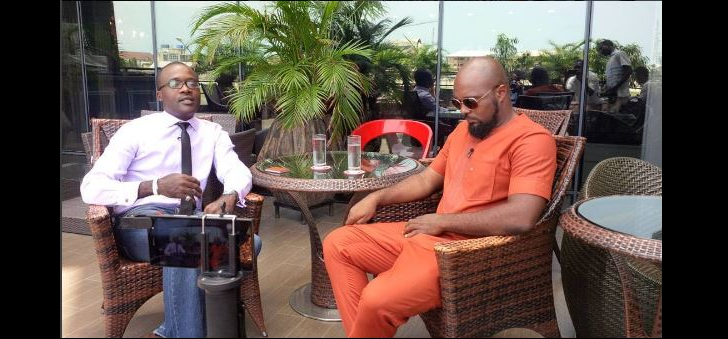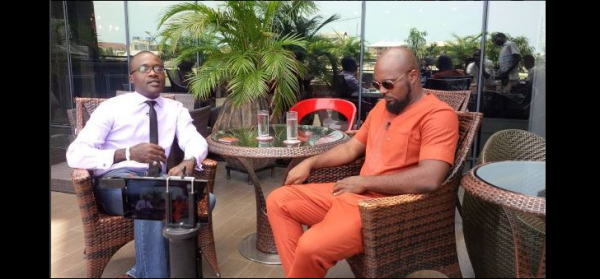What is your background?
I trained in audiovisual production at the Lenscope Media, a private institute located in Jos. A lecturer at Nigerian Film Institute, Jos, owns the institute. We did a lot of projects and class work and other things.
How long have you been in the business?
I have been in the business for over 15 years but I have been working behind the scene; I did post-production for over 10 years and I started directing in 2013 but I was writing while I was doing post-production.
And how many films have you produced?
I have done about six films.
Can you tell us about some of them?
They include: False; A Mother’s Figh; The Other Side. Sink Or Swim. The latter is a big project and we had about 13 lead actors from over seven African counties, including Kenya, Nigeria, Ghana, Zambia, Ivory Coast and Burkina Faso. The story has to do with Africans trying to go to Europe through the Sahara Desert. We had scenes from the desert and capsizing of ships and it was quite a challenging project.
Can you tell us about the workshop you are planning to do in Lagos?
We are trying to empower young people, telling them that there is a lot that they can do with their smart phones and the workshop is tagged “Smart phone filmmaking workshop.” We want to show young people that they can do a lot with their smart phones. They can do films, documentaries with their smart phones.
What motivated you into film production?
I love telling stories; I am a storyteller. I love to motivate and inspire people and I believe that I have a lot of stories to tell and I found that filmmaking is one big tool to do that. Storytelling is a big avenue to capture people’s attention and encapsulate the messages you want to pass across; basically that was why I went into film production.
We are planning a workshop on 21 May in Lagos and it is tagged “Treasure wells smart phone filmmaking workshop.” The reason for the workshop is that technology has evolved so much that the phones people have in their hands can do more than text messages, calls and browsing; they can actually use their phones as productive tools. A lot of young people reached out to me because of my work in the industry through social media: facebook, instagram, and twitter indicating their interest and passion for filmmaking. Many people want to go into filmmaking as writers, actors and directors; some people want to become producers. They have stories they will love to produce but they usually do not have the funding because traditional filmmaking requires a lot of funding in the course of hiring equipment, the state of the art camera and all of that. However, the use of smart phones has democratised the art of filmmaking elsewhere in the world. For instance, in the U.S. and Europe, there is a lot going on out there. There are film festivals for films made with smart phones and this is what we want to bring to Nigeria. There are films made with smart phones that are getting distribution. The smart phones people have in their pockets have the same capacity as the big cameras to achieve professional quality videos. For instance, some phones can shoot 4k video; that is like two times the quality of HD, which is what big cameras shoot with. Other big cameras shoot 4k and that is very expensive to rent or buy. With a phone in your hand, you can do a lot; this is not just for people who wants to make films but also for people who wants to make V-logs. A lot of bloggers want to migrate from just writing to videotaping their blogs. This is an opportunity for them. What we are trying to teach is that you already have the tool and all we need to do is to teach them how to use it. So you can do documentaries and music videos. For instance, one of Beyonce’s big videos a year ago was shot on an I-phone and people know this fact. People have not been able to have access to this type of workshop where we are going to actually teach them how to use their phones to make films.
What is your assessment of the Nigerian film industry?
My assessment of the Nigerian film industry is that we have not got to where we need to be but we have made some progress. However, piracy is a big issue and needs to be emphasised. The most painful aspect of it is the fact that government is not doing enough to change the situation. The Nigerian Censors Board collects your money, censors your films and all that; that is where it stops. They are not doing anything for the filmmaker and that is a very big issue right now.
Is the industry not growing?
The industry is growing and fortunately for the filmmaker, the industry is one that can use global trends and technology to ride to success. For instance, the Internet is one tool that the filmmaker has that is powerful. Filmmaking, because of the internet and technology has been democratised, meaning that anybody can produce content and distribute it globally using the internet. You can set up your own website and sell your film to whoever wants to buy all over the world depending on who can reach. That way, the global trends in technology have impacted on the film industry in the country. We are making a lot of progress but government still needs to do a lot. I am not part of the people who will say that government should give us money or grant; that is good but if you give us money or grant and you do not fight piracy, you are wasting your money because you will have people who take money and cannot return it. They take the grants or loans and produce and you do not tackle piracy, everything sinks. In that situation, you have not done anything.
Some actors and actresses say it is the producers that take a huge part of profit in the industry, leaving them almost empty handed. What is your comment on this?
It is unfair for the actors to say that if they have a correct picture of what goes on in the industry. In fact, I will say that the actors are making more money than the producers. The producer puts money together to produce a film and the actor is paid one hundred per cent upfront; the actor finishes the project and moves on to another project. Another producer hires and pays the actor but the producer sits with project for months with the editor until it comes out. The painful part of it is after the energy that went into the film and when it comes out, there is no market for it. If DSTv, Iroko or Ibaka do not buy it, the producer is stuck with the film. Sometimes these organisations pay pittance for the film. The market is so depressed that you wonder people are still producing films.
How can we improve the distribution system so that more people can access the films?
It is not rocket science; we need more cinemas. We need more screens in the country. Government should build more cinemas instead of giving money to actors. We can have one community cinema in every local government in the country.
Republished with permission from Independent Newspapers Limited


